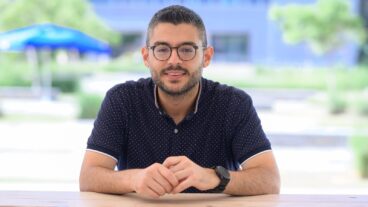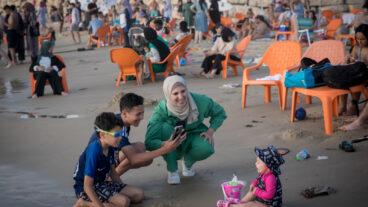Israel Ben Tzur (left) and Stepac warehouse manager Magid Hamdan wear flak jackets in the company’s offices.The sirens were going off and the rockets were falling less than a mile away, but Israel Ben Tzur was carrying on a conversation on his cell phone as if he were sitting poolside with an iced tea in his hand.
As founder and CEO of Galilee-based Stepac L.A. Ltd. – an area which is currently a regular target of Hizbullah Katyusha rockets – Ben Tzur has gotten used the piercing sounds and thudding crashes that punctuate the days and nights of residents of Israel’s north.
“If you are lucky the sound of these rockets is distant and hollow, yet, sometimes it is like a great and close up thunder sending reverberating shivers down our spine and our nerves,” he wrote in an email at the beginning of the war.
But like other companies in the area, the family-run Stepac has succeeded in circumventing the dangers and difficulties of maintaining a business during war time. And in doing so, Ben Tzur and his wife Shosh – the company’s VP of Operations and Administration – have proved to be an inspirational model for the company’s 68 employees, and for all Israelis.
“We’re a manufacturing company that makes innovative medical and food packaging which extends their shelf life – especially of fresh produce,” Ben Tzur told ISRAEL21c in a conversation that was occasionally interrupted by the shrill sound of a siren signaling an incoming rocket.
Founded in 1992, Stepac operates throughout the world in the fresh produce supply chain and medical community. Their patented Careright product line services primarily medical, dental and veterinary clinics, providing them with a line of infection control barrier films and sterilization bags, while their Xtend products and services serve the fresh produce industry with advanced humidity packaging.
Hundreds of customers around the world use Stepac’s products, like California-based Ocean Mist Farms, which last year began shipping its iceless broccoli with the patented Xtend system. Joe Pezzini, VP of operations for Ocean Mist, told a trade packaging publication that he chose Stepac’s technology because of its capabilities in cooling and reducing moisture loss, thus keeping the vegetables fresh.
Located an hour east of Haifa at the Tefen Industrial Park, established by industrialist Stef Wertheimer in the mid-1980s, Stepac is one of 60 companies that employ some 4,000 workers, mixed between Jews, Druze and Arabs.
“We draw on employees from the surrounding communities like Nahariya, Karmiel and Ma’a lot and the Druze villages in the area,” said Ben Tzur, who lives in nearby Kfar Vradim.
“At the beginning of the war, we continued working for two or three days. When I arrived at the office I was surprised to see most of StePac staff in the office, even those that were asked specifically to stay at home and out of harms way. We cleaned the bomb shelter and took all steps to ascertain production under adverse conditions with minimum interruptions and damage to StePac business assuming that this conflict was not going to be over within a day or two.”
But when the rocket barrages from Lebanon began to intensify, the Ben Tzurs decided to close the plant and provide for their employees’ safety.
“We took all our employees and their families down to hotels at the Dead Sea for three days – it was the entire Stepac community,” said Ben Tzur.
Upon the group’s return to the North, a staff meeting was held along with the families of the workers, and together a decision was made to reopen the plant and begin working on two 12 hour shifts around the clock in order to keep up with customers’ orders.
“Our employees made the decision,” said Ben Tzur, despite the fact that the factory next to Stepac had suffered a direct hit from a Katyusha.
“We organized it so that only those whose presence was critical at the plant came in to work. Those who handled administrative or technical tasks operated remote from laptops at home or elsewhere. In that manner, we’ve continued to work supplying our customers with orders in a non-interrupted manner.”
“I have to say that we’re not the only ones working in this way. In our neighborhood at Tefen, many companies are taking the necessary steps to keep their businesses going.”
With no end in sight to the fighting in the area, Ben Tzur said that the company is hunkered down for the long haul, and that they’ve received strength from an unlikely source – their customers.
We’ve been receiving non-stop calls of support from customers all over the world – the US, Asia, South America. They’re all very concerned for our welfare,” he said, as another siren brought the call to an end.












